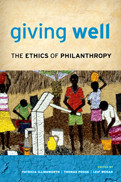
Giving Well: The Ethics of Philanthropy
Patricia Illingworth, Thomas Pogge, & Leif Wenar
320 pages, Oxford University Press, 2011
Much evidence exists that a golden age of philanthropy is upon us, as corporations, wealthy individuals, and ordinary Americans give at record levels, and often with higher standards for effectiveness and impact. Consequently, there’s a great need for reliable information about who should give, whether the giving is accomplishing its aims, and how to give and evaluate giving more effectively.
Into the breach step the editors of Giving Well, an interdisciplinary volume of essays. Patricia Illingworth, Thomas Pogge, and Leif Wenar promise an “unmatched introduction to the ethical issues surrounding giving.” With contributions from such academic luminaries as Peter Singer, Thomas W. Dunfee, and Pogge himself, expectations run high, and many of the essays are indeed substantive and stimulating. The problem is that much of the information in the book isn’t new; the contributions from Singer, Dunfee, and Pogge repeat ideas and even entire essays published elsewhere. And the ideas presented in the new essays in the collection are often inaccessible because of excessively turgid academic prose.
Exceptions exist. For example, the essay by Stanford University political scientist Rob Reich is both clear and illuminating, extending his prior explorations of tax incentives for giving. Reich finds wanting the two main justifications for charitable deductions: taxable income and government subsidies to charities, which as currently implemented tend to benefit wealthy citizens instead of the general public or the poor. But he notes that a third, even more defensible rationale for giving—encouraging pluralism—also fails, because the regressive design of deductions in most countries disproportionately favors the rich. (I might add that the bias toward supporting particular dominant religions in the United States and many other countries also could undermine the pluralism rationale.)
Truly indispensable, despite being reproduced from elsewhere, are Singer’s essay on the duty of citizens of more affluent countries to help the global poor, with giving based on citizens’ income levels, and Pogge’s essay on the complex array of issues, such as maximizing the number of lives that can be saved, that international non-governmental organizations should consider. Although readers may disagree with some of the points made by these authors, no one serious about ethical giving can fail to engage with them at some level.
Still, I would have hoped for more insights into current philanthropic trends, such as the mechanisms by which the Bill & Melinda Gates Foundation is transforming global health through its public-private partnerships, investments, and strategic and business approaches. Notwithstanding Dunfee’s insightful essay, “The Unfulfilled Promise of Corporate Philanthropy,” there is too little information about the exciting new contributions many corporations are making to persistent global challenges, such as poverty, inequality, health, water, food, illiteracy, climate change, conflict, and war.
Multinational corporations are recognizing that the natural and social systems in jeopardy are important to their businesses and to people around the world. They are bringing their core competencies, strategic resources, and drive for results to help address root causes as well as symptoms of problems. This is significant, since the scale of the world’s challenges transcends the abilities of any single player. What we need are multi-stakeholder and rights-based approaches to sustainable development, as evidenced by the United Nations Global Compact and the call to action for corporations to support the U.N.’s Millennium Development Goals.
Illingworth’s essay highlights the crucial importance of fostering social capital through infrastructure, laws, norms, and values that enable trust and cooperation. She rightly points out that global social capital is undermined by the policy of limiting deductions to donations to charities within the United States. She could have included, however, examples of concrete philanthropic initiatives enhancing social capital besides microfinance, especially given the criticism it has encountered recently.
The rest of the essays in this collection vary in quality from the outstanding (Roger C. Riddell’s survey on the value and limits to foreign aid), to the relevant and interesting (Alex De Waal’s examination of how humanitarianism in Sudan has contributed in unexpected ways to good and evil outcomes), to the ill-conceived and misleading (Leif Wenar presents stale and sophistical arguments against aid, as does Ken Anderson against international NGOs).
Wenar unfairly and myopically evaluates Singer’s approach to poverty alleviation, excluding all the nuance and recognition of the complexity of giving in Singer’s argument. He adopts such an unrealistically skeptical view of aid that—his disclaimers notwithstanding—his argument would seem to discourage donations altogether. Anderson attacks multi-stakeholder action by calling it “global governance,” inaccurately defining this well-established concept as “one overarching lawgiver for the planet,” without addressing its widespread acceptance as coordinated action involving nonstate and state actors. Although it’s fine that such contrarian views are included in this collection, it is too bad that Singer and the others were not given a chance to respond to these mischaracterizations.
Giving Well may gloss over some of the most salient aspects of giving trends, but it usefully brings together a number of valuable essays that explore the promise of new directions of philanthropy. Its main contribution may be that it highlights the vital need for greater and more ethical generosity—and for continuous improvement of the effectiveness of the “new philanthropy.”
Chip Pitts teaches corporate social responsibility at Stanford Law School and Oxford University. He is the co-author and editor of Corporate Social Responsibility: A Legal Analysis.

